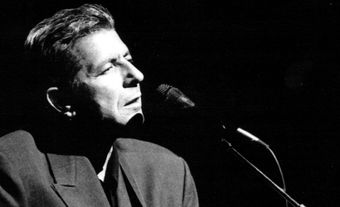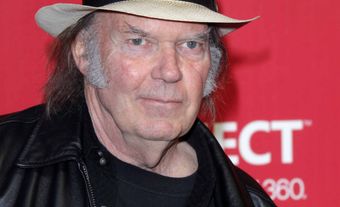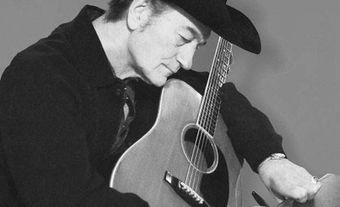Gordon Meredith Lightfoot, CC, OOnt, singer, songwriter, guitarist (born 17 November 1938 in Orillia, ON; died 1 May 2023 in Toronto, ON). Gordon Lightfoot is one of the most acclaimed and respected songwriters of the 20th century, and one of the most significant musicians Canada has produced. The country’s top male recording artist of the 1970s, Lightfoot first drew attention in the mid-1960s when his songs were covered by Ian and Sylvia and Peter, Paul and Mary, among others. Lightfoot achieved stardom as a solo artist with such hits as “If You Could Read My Mind,” “Sundown,” “Carefree Highway” and “Rainy Day People.” His albums have sold more than 10 million copies worldwide. He won 12 Juno Awards from 28 nominations, including Male Vocalist of the Year four times (1971–73, 1975) and Folksinger of the Year five times (1970, 1975–78). He was inducted into the Canadian Music Hall of Fame, Canada’s Walk of Fame, the Canadian Songwriters Hall of Fame, the US Songwriters Hall of Fame, the Canadian Country Music Hall of Fame and Canadian Folk Music Walk of Fame, among many other honours.
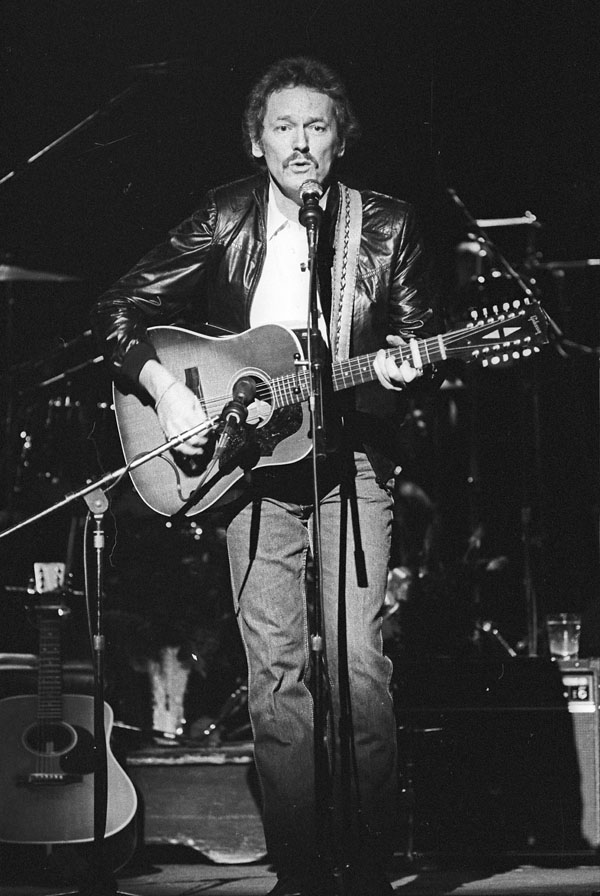
Early Life and Education
From an early age, Lightfoot’s parents, Jessica and Gordon Lightfoot Sr., supported his interest in music. As a boy soprano in Orillia, Lightfoot performed on local radio, in oratorio and operetta, in weddings across southern Ontario and in Kiwanis Music Festivals. He appeared at age 13 in a concert of Kiwanis festival winners at Massey Hall, the site of many of his later triumphs. In 1952, he won first place in the "soprano unchanged voices" class at the Kiwanis Festival.
At 14, Lightfoot began working at his father’s dry cleaning plant, where he worked throughout high school. In his teens, he was a star track and field athlete and played on the school football team. He also studied piano, taught himself to play drums and sang in a barbershop quartet called The Collegiate Four. In 1954, The Collegiate Four won first prize in a CBC TV talent competition called Pick the Stars. Lightfoot also won several competitions with the quartet the Teen-Timers in 1955.
From 1957 to 1958, Lightfoot lived in Los Angeles. He studied jazz orchestration at Westlake College of Music in Los Angeles and earned a living writing and arranging commercial jingles.
Early Success as a Songwriter
After returning to Canada, Lightfoot worked as a bank teller and drove a truck for 14 months. From 1959 to 1961, he appeared on CBC TV's variety show Country Hoedown with the groups the Singing Swinging Eight and the Gino Silvi Singers. During that time, Lightfoot also began singing folk songs and playing guitar around Toronto. (See also Riverboat.)
In 1962, he released two singles: “(Remember Me) I'm the One” and “Negotiations/It's Too Late,” which both received substantial airplay in Canada. Lightfoot then teamed up with Teen-Timers member Terry Whalen and performed as the Two Tones in southern Ontario coffee houses. The pair released a live LP domestically titled Two Tones at the Village Corner in 1962. They also performed at the Mariposa Folk Festival that year.
In 1963, Lightfoot went to Europe and served for one season as the host of BBC TV's Country and Western Show. Upon his return to Canada, he appeared in coffee houses and bars in Ontario, Quebec and the eastern United States. Despite his performances in the US, Lightfoot was initially known there more widely as a songwriter. In 1964, Ian and Sylvia saw Lightfoot perform in Toronto and recorded his songs “For Lovin' Me” and “Early Morning Rain.” “For Lovin' Me” was also a substantial hit in 1965 for Peter, Paul and Mary. It was later recorded by Chad and Jeremy, the Johnny Mann Singers, Elvis Presley and others.
Ian and Sylvia introduced Lightfoot to their manager, Albert Grossman, who became Lightfoot's manager throughout the 1960s. In 1965, Lightfoot had a Canadian hit with his single “I'm Not Sayin.’” A cover by American country artist Leroy Van Dyke was popular in the US. Marty Robbins’s version of Lightfoot's next single, “Ribbon of Darkness,” was a No. 1 country hit in the US in 1965. Lightfoot songs were introduced to new audiences in the mid-1960s through recordings by Harry Belafonte, Judy Collins, George Hamilton IV (who later made an LP titled Lightfoot Country consisting exclusively of Lightfoot songs), Richie Havens, and The Kingston Trio.
1960s Solo Albums
In 1966, Lightfoot’s debut album, Lightfoot!, was released to critical and commercial acclaim, making him one of the first Canadian musicians to achieve international success without leaving Canada. In honour of Canada's Centennial, Lightfoot was commissioned by the CBC to write a song for their special 100 Years Young, which aired on 1 January 1967. The result was the “Canadian Railroad Trilogy,” which recounts the construction of the Canadian Pacific Railway across Canada in the 1880s. The song was featured on Lightfoot’s second album, The Way I Feel (1967). He embarked on his first cross-Canada tour that same year.
Following this success, in the late 1960s Lightfoot quickly released three more albums: Did She Mention My Name? (1968), Back Here On Earth (1968) and his first live album, Sunday Concert (1969), which was recorded at Massey Hall. At the close of the decade, he had been voted Top Folk Singer of the Year four times (1965, 1966, 1968 and 1969) in RPM’s annual reader polls.
Canada’s Male Recording Artist of the 1970s
By 1970, Lightfoot’s reputation as a “folk singer and composer of folk songs of international renown” was so significant that he was named an Officer of the Order of Canada. That same year, he won a Juno Award (known at the time as a Gold Leaf Award) for Top Folksinger. By 1971, Lightfoot had his first international hit with the single “If You Could Read My Mind.” It reached No. 1 on the RPM Top Singles chart in Canada and No. 5 on the Billboard Hot 100 chart. The song was also nominated for a Grammy Award for Best Pop Performance, Male in 1971 and was later covered by Liza Minnelli, Stars on 54, Barbra Streisand and many others. “If You Could Read My Mind” appeared on Lightfoot's sixth album, Sit Down Young Stranger (1970), which was renamed If You Could Read My Mind following the success of the title track. If You Could Read My Mind peaked at No. 12 on the Billboard 200 chart and by 1972 was certified gold in the US.
Lightfoot's seventh album, Summer Side of Life (1971), reached No. 3 on the Canadian sales chart. Lightfoot reached No. 1 for the first time a year later with his eighth album, Don Quixote (1972). Lightfoot won Juno Awards for Top Male Vocalist in 1971 and Male Vocalist of the Year in 1972. The string of chart-toppers continued with Lightfoot's second album released in 1972, Old Dan’s Records. It reached No. 1 on the RPM album chart and No. 95 on the Billboard 200 chart, thanks largely to the popularity of the title track.
While performing at Massey Hall in March 1972, Lightfoot suffered an attack of Bell’s palsy that left his face partially paralyzed. He temporarily suspended his touring activities to recover, returning in 1973 to win Juno Awards for Male Vocalist of the Year and Composer of the Year. In 1974, Old Dan's Records won Folk Album of the Year.
Sundown (1974), Lightfoot's tenth album, reached No. 1 on both the Billboard 200 chart and the RPM 100 chart in 1974. The title track reached No.1 on RPM's National Singles chart and No. 1 on Billboard's Hot 100 chart, making “Sundown” the only Lightfoot song to hit No. 1 in the US. Sundown also marked the peak of Lightfoot’s acoustic folk-country blend before he started including more electric instrumentation in his songs.

“Rainy Day People,” the highlight of Cold on the Shoulder (1975), reached No. 10 on the RPM Singles chart and was a Top 40 hit in the US. It also reached No. 1 on both the RPM Adult Contemporary and the Billboard Easy Listening charts. The double-LP Gord’s Gold, a greatest hits compilation released that same year, featured some of his most popular songs (some of which he re-recorded) from his earlier albums. It was certified double-platinum in both Canada and the US. (See also Music Canada Sales Certifications.)
Lightfoot returned to the top of the Canadian albums chart with the platinum-certified Summertime Dream (1976), which marked his commercial high point. It is best known for its haunting single, “The Wreck of The Edmund Fitzgerald,” which Lightfoot called his favourite of all of his songs. The song about the 1975 sinking of a ship that drowned 29 men in Lake Superior reached No. 1 in Canada and No. 2 on the Billboard Hot 100 chart. It won the Juno Award for Composer of the Year in 1977. It was also nominated for Song of the Year and Best Pop Vocal Performance, Male at the 1977 Grammy Awards.
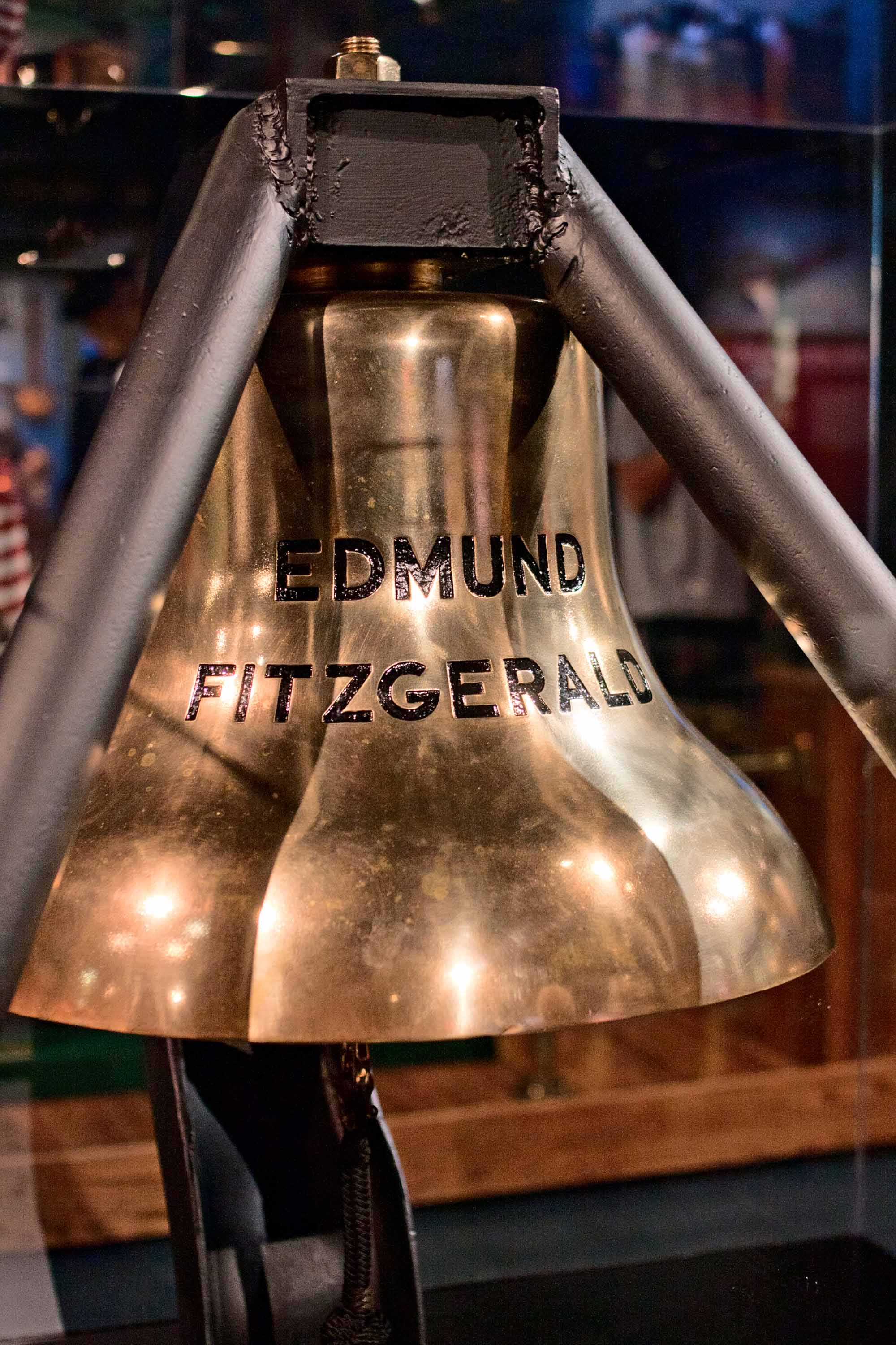
(c) Jason A. Paul | Dreamstime.com
Lightfoot’s ninth and final album of the decade, Endless Wire (1978), reached No. 2 in Canada despite being considered weaker than its predecessors. In 1978, Lightfoot won Folksinger of the Year at the Juno Awards, marking the fourth year in a row he took home that award. In 1980, Lightfoot and Anne Murray were named Canada's male and female recording artists of the previous decade by the Canadian Recording Industry Association (now Music Canada). Lightfoot’s achievements in the 1970s include three platinum and nine gold records in the US, and four Grammy nominations.
1980s and 1990s
In the 1980s and 1990s, Lightfoot’s new songs were played less frequently on the radio and his sales declined. Following Dream Street Rose (1980), the uptempo, country-influenced material that had made Lightfoot an international folk superstar in the 1970s gave way to a more adult-contemporary sound; an increased use of synthesizer and organ was typified on the albums Shadow (1982), Salute (1983) and East of Midnight (1986). The latter album yielded the single “Anything for Love,” co-produced by David Foster and featuring him on keyboards. It reached No. 13 on Billboard’s Adult Contemporary chart.
Although Lightfoot’s commercial success and critical acclaim waned in the 1980s, his stature within the industry remained strong. He was nominated for Folk Artist of the Year at the Juno Awards in 1980, 1981 and 1983, and earned Male Vocalist of the Year nominations four years in a row (1981–84). He was inducted into the Canadian Music Hall of Fame by his longtime friend Bob Dylan at the Juno Awards in 1986.
In 1988, Lightfoot performed in the opening ceremonies of the Olympic Winter Games in Calgary. That year also saw the release of the second volume of Gord's Gold, which was certified platinum in Canada. It includes re-recorded older songs alongside some of Lightfoot's most popular tracks that were not included in Gord's Gold Vol. 1.
Lightfoot also dabbled in acting in the 1980s, playing a US marshal in Harry Tracy: the Last of the Wild Bunch (1983) with Bruce Dern and Helen Shaver, and landing an appearance on the ABC melodrama Hotel (1988).
Lightfoot returned to his acoustic roots with the self-produced Waiting For You (1993). Five years later, he released A Painter Passing Through (1998), which included Daniel Lanois contributing guitar. That year, Lightfoot was also inducted into Canada's Walk of Fame. In 1999, Songbook was released, a four-CD set that featured material from throughout his career to that point as well as 16 previously unreleased songs.
21st Century
By January 2002, Lightfoot had written 30 new songs and was beginning to record the studio album Harmony. In April, his Complete Greatest Hits collection was released, which has since been certified gold in Canada. However, in September 2002, Lightfoot suffered a near-fatal abdominal aneurysm that left him in a coma for six weeks and necessitated a long recovery process.
In 2003, Lightfoot was promoted within the Order of Canada to Companion. In bestowing the honour, Governor General Adrienne Clarkson praised Lightfoot’s “unique ability to blend contemporary urban music with our traditional roots” and noted that “he has influenced a host of other musicians with his versatility and thought-provoking lyrics… and remains one of Canada's most beloved musicians.”
Harmony, Lightfoot's 20th studio album, was eventually released in 2004. He also made an appearance that year on CTV’s Canadian Idol. In 2006, Lightfoot suffered a stroke onstage but was touring again within a year.
In February 2010, Lightfoot was the subject of a death hoax after CTV journalist David Akin reported through his personal social media pages that Lightfoot had died. While driving home, Lightfoot heard the reports of his death on the radio and immediately phoned the station to confirm he was alive.
In February 2012, Lightfoot was awarded a Queen’s Diamond Jubilee Medal for his work in community service. In April, Lightfoot released All Live, a collection of songs recorded live at several of his Massey Hall concerts between 1998 and 2001. In November 2012, Lightfoot performed “Canadian Railroad Trilogy” at the 100th Grey Cup in Toronto. In 2015, Lightfoot produced a cover of Robbie Robertson’s “Christmas Must Be Tonight” by long-time friend Ronnie Hawkins. The two also collaborated on a cover of Lightfoot’s 1970 song “The Pony Man,” which Lightfoot wrote for his children.
Despite being in his late-70s, Lightfoot continued to tour extensively, performing 67 shows throughout North America in 2015. In 2016, he undertook an 11-date tour of the United Kingdom and Ireland, his first tour there in 35 years. On 18 November 2016, he released his first song in 12 years, the single “Plans of My Own,” which was recorded in 2001. In 2017, Lightfoot performed in Ottawa as part of Canada’s 150th birthday celebrations. The feature documentary Gordon Lightfoot: If You Could Read My Mind was released in 2019. The album Solo, featuring some of Lightfoot’s unreleased studio recordings, was released in 2020.
Performances at Massey Hall
Gordon Lightfoot is more closely associated with Massey Hall, Canada’s oldest and most venerated concert hall, than any other artist. Throughout his career, Lightfoot played at Massey Hall on an almost annual basis. He made his 160th appearance at the historic Toronto venue in November 2016. On 14 June 2018, he headlined the hall’s 124th anniversary celebrations, which also featured Jim Cuddy, Sarah Harmer, Buffy Saint-Marie, Joel Plaskett and Sam Roberts. The celebrations culminated with three nights of Gordon Lightfoot concerts leading up to 2 July, when the venue closed for renovations. It officially reopened on 25 November 2021 with a concert by Lightfoot.
Characteristic Style
Lightfoot’s songs are typically marked by his robust and attractive baritone voice, a dark, often unsentimental romanticism, and an impressionistic, almost painterly use of natural imagery in his lyrics. Singer-songwriter Matthew Good once described Lightfoot as the “Emily Carr of Canadian songwriting,” while Brian D. Johnson of Maclean’s called him Canada’s “musical answer to the Group of Seven.”
Reviewing Sundown in 1974, Geoffrey Stokes of the Village Voice noted Lightfoot's “extraordinary sensitivity to pain — his own and others — and joy... Vulnerable and open in a way that he denied in his earlier writing, Lightfoot's is the voice of the romantic.” Also in 1974, Rolling Stone’s Stephen Holden observed that “Lightfoot's reflections are those of a mature man, capable of strong romantic and political emotions, tempered by a suave sexuality and an elegiac mysticism… Lightfoot’s singing is almost crooning — a style which understates and redeems the rhetorical and sentimental conventions intrinsic to all formal songwriting.” The Toronto Star’s Joel Rubinoff observed in 2016 that “Early Morning Rain” captures “the mood of bittersweet reflection for which Lightfoot would become famous.” Vanity Fair’s Mike Sacks described the folk-rock legend’s body of work as “melancholy rock, songs for those who like to feel, songs about loss, regret, and maritime disasters, songs carried along by a haunting, gorgeous undertow.”
Personal Life
Lightfoot was married in 1963 to Brita Ingegerd Olaisson. They had two children, Fred and Ingrid, and divorced in 1973, in large part because of Lightfoot’s three-year affair with Cathy Smith. (She had been involved with members of The Band and later served 15 months in prison for her role in the overdose death of comedian John Belushi in 1982.)
Lightfoot’s troubled relationships provided the inspiration for many of his songs. In a 2016 interview with the Toronto Star, he confessed that he stopped singing “For Lovin’ Me” after 25 years because “it was a song I wrote while I was in a marriage I knew wasn’t going to work out and it must have been terribly offensive to my wife. After a while it bothered me so much when I would sing it, I would find myself thinking about what a terrible person I was at the time.” He has said that he wrote “If You Could Read My Mind” in one afternoon in 1969 in a vacant Toronto house during a separation that led to his first divorce. He also noted that his relationship with Smith was the inspiration behind his hit song “Sundown.”
Lightfoot married Elizabeth Moon in 1989. They had two children, Miles and Meredith, and divorced in 2011 after separating in 2003. Lightfoot then married Hollywood background actor Kim Hasse in 2014. A hard drinker for much of his life, Lightfoot gave up alcohol in 1982, though he continued to smoke cigarettes into his 70s.
Covers and Tributes
In a career spanning six decades, Gordon Lightfoot released nearly 300 songs covering a range of styles, including, in the words of his SOCAN member profile, “historical epics, romantic ballads, sea shanties, country ditties, folk-style protests and bluesy ‘toe-tappers.’” Lightfoot's lyrical and musical prowess has influenced generations of musicians and artists around the world, including singer-songwriters Dan Fogelberg, Jimmy Buffett, Jim Croce, Ron Sexsmith and Bob Dylan, who called Lightfoot one of his favourite songwriters and once said, “Every time I hear a song of his, it’s like I wish it would last forever.” The Guess Who were also influenced by Lightfoot; their album Wheatfield Soul (1968) includes the song “Lightfoot,” which references some of his song titles in its lyrics.
In addition to the covers previously mentioned, Lightfoot's songs have been interpreted by a seemingly endless list of artists that includes the Irish Rovers, Sarah McLachlan, John McDermott, Anne Murray, Rheostatics, Ian Tamblyn, Carroll Baker, Stompin’ Tom Connors, The Good Brothers, Hagood Hardy, Ronnie Hawkins, Rob McConnell and The Boss Brass, The Mercey Brothers, Ronnie Prophet, The Rankin Family, Hank Snow, Valdy, Elvis Presley, Bob Dylan, Barbra Streisand, Olivia Newton-John, Glen Campbell, Johnny Cash, Eric Clapton, The Grateful Dead, Waylon Jennings, Alison Krauss, Jerry Lee Lewis, Johnny Mathis, Don McLean, Nana Mouskouri, Lou Rawls, The Replacements, Bobby Sherman, Peter Tosh, Conway Twitty, Paul Weller, Roger Whittaker, Andy Williams and many others.
In a 2008 interview with the Arkansas Democrat Gazette, Lightfoot said, “I never heard a cover of one of my songs that I didn't like… I would be amazed that people would enjoy my songs enough to want to record them, and it inspired me and made me want to work harder.”
Throughout the years, numerous tribute shows for Lightfoot have also taken place, including one at Toronto’s Hugh’s Room in January 2009, where Lightfoot attended and performed “Song For A Winter's Night.” A tribute album entitled Beautiful: A Tribute To Gordon Lightfoot was released in 2003 and features such prominent Canadian artists as Cowboy Junkies, Bruce Cockburn, Blue Rodeo, Blackie and the Rodeo Kings, The Tragically Hip and Murray McLauchlan covering Lightfoot songs.
In 2010, Canadian painter Ian Wallace published a book of pastel drawings illustrating Lightfoot's “Canadian Railroad Trilogy." In 2011, the Canadian music blog Herohill released a Lightfoot tribute album entitled Turning Back the Pages of My Sweet Shattered Dreams, which featured independent artists across Canada including Shotgun Jimmie, Octoberman and Folly the Hunter.
Legacy and Significance
Called a “national treasure” by The Band’s Robbie Robertson, Lightfoot is one of the most acclaimed and respected songwriters of the 20th century, and one of the most significant musicians that Canada has ever produced. Ian Tyson once said that nobody “before or since has had the impact on Canadian culture, through popular music or folk music, that Gordon Lightfoot has had.” Producer David Foster described Lightfoot's voice as “part of the fabric of Canada.”
When Lightfoot was inducted into the US Songwriters Hall of Fame in 2012, he was heralded as a singer who helped “define the folk-pop sound of the 1960s and 1970s.” In November 2016, the Toronto Star wrote, “For the generation of Canadians who grew up in the 1960s and ’70s, he’s the musical equivalent of maple syrup and Mounties, a guy who not only represented Canada at a pivotal moment in its cultural history but actually became its voice.”
With its numerous references to Canada, Lightfoot's music and lyrics have long been a source of nationalist pride in Canada. His music is often described as quintessentially Canadian; “Canadian Railroad Trilogy” in particular has been heralded as an unofficial national anthem.
Honours
In addition to being inducted into numerous halls of fame, Lightfoot also received numerous other honours throughout his career. In 1990, he received SOCAN's William Harold Moon Award, “given to a member who has brought international recognition to Canada through their music.” Further honours include the Governor General's Performing Arts Award, inductions into the Canadian Broadcast Hall of Fame and the Canadian Country Music Hall of Fame, and a Toronto Arts Award for lifetime achievement.
“If You Could Read My Mind” was inducted into the Canadian Songwriters Hall of Fame in 2003. In 2007, Canada Post honoured Lightfoot with a postage stamp alongside Anne Murray, Paul Anka and Joni Mitchell. In 2014, CBC listed “Sundown” at No. 17 on their list of 100 Best Canadian Songs Ever. In 2017, the broadcaster ranked him at No. 5 on its list of the 25 best Canadian Songwriters ever.
Lightfoot was awarded SOCAN's Lifetime Achievement Award in June 2014 for his “nearly 300 published songs, including many of the greatest in the Canadian repertory of classics.” On 23 October 2015, Lightfoot was honoured in his hometown of Orillia with a four-metre-tall bronze sculpture called Golden Leaves — A Tribute to Gordon Lightfoot. The sculpture depicts Lightfoot sitting cross-legged and playing an acoustic guitar underneath an arch of golden maple leaves.

Awards
- Top Folksinger (or Group) (1970)
- Top Male Vocalist (1971)
- Male Vocalist of the Year (1972)
- Male Vocalist of the Year (1973)
- Composer of the Year (1973)
- Folk Album of the Year (1974)
- Male Vocalist of the Year (1975)
- Folksinger of the Year (1975)
- Folksinger of the Year (1976)
- Folksinger of the Year (1977)
- Composer of the Year (1977)
- Folksinger of the Year (1978)
- Canadian Music Hall of Fame (1986)
RPM Awards
- Top Folksinger (1965, 1966, 1968, 1969)
- Top Male Vocalist (1967)
Others
- Officer, Order of Canada (1970)
- Orillia Hall of Fame (1971)
- Pop Record of the Year (“Sundown”), Music Operators of America (1974)
- Canadian Male Recording Artist of the Decade, Canadian Recording Industry Association (1980)
- Member, Order of Ontario (1988)
- Toronto Music Awards Lifetime Achievement Award (1989)
- SOCAN William Harold Moon Award (1990)
- Governor General’s Performing Arts Award (1997)
- Canada’s Walk of Fame (1998)
- Canadian Broadcast Hall of Fame (2001)
- Canadian Country Music Hall of Fame (2001)
- Audio-Visual Preservation Trust Masterworks Award (2001)
- Lifetime Achievement, Toronto Arts Awards (2001)
- Companion, Order of Canada (2003)
- Canadian Songwriters Hall of Fame (2003)
- Canadian Folk Music Walk of Fame (2003)
- Canadian Railway Hall of Fame (2003)
- Canadian Music Industry Hall of Fame (2005)
- Songwriters Hall of Fame (United States) (2012)
- Queen’s Diamond Jubilee Medal (2012)
- Lifetime Achievement Award, SOCAN (2014)
- Gold Medal, Royal Canadian Geographic Society (2017)
- Golden Plate Award, American Academy of Achievement (2022)
Honorary Degrees
- Honorary Doctor of Laws, Trent University (1978)
- Honorary Doctor of Laws, University of Toronto (2014)
- Honorary Doctor of Music, Lakehead University (2015)

 Share on Facebook
Share on Facebook Share on X
Share on X Share by Email
Share by Email Share on Google Classroom
Share on Google Classroom

